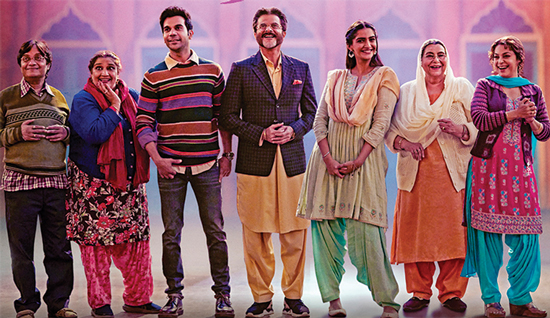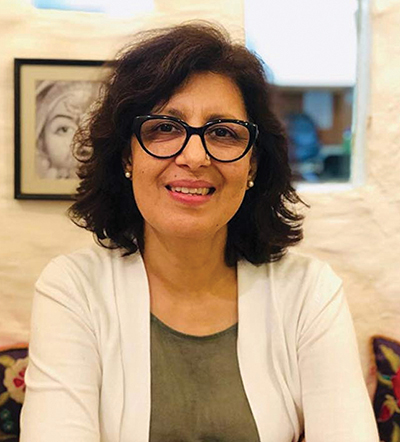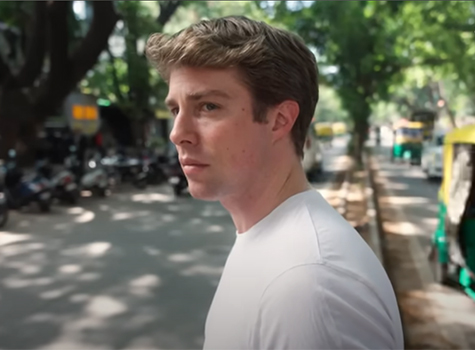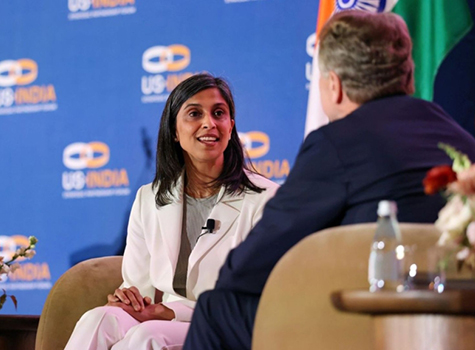
If there is a young, unmarried woman in a Hindi film it’s very likely her family is on the lookout for the perfect bridegroom. But in Ek Ladki Ko Dekha Toh Aisa Laga (ELKDTAL) bachelorette Sweety wants nothing to do with finding a groom, as she dreams of marrying a bride. How both she and her conservative family navigate a journey towards acceptance and unconditional love forms the heart of the film starring Sonam Kapoor, Rajkumar Rao, Anil Kapoor and Juhi Chawla. First-time director Shelly Chopra Dhar, who recently became a Nani (maternal grandmother) for the first time, sat down with me for an interview in New York City. Dhar discussed her recent release, breaking down barriers and why everyone who watches her film will relate with at least one character.
This film is your big introduction to audiences. Can you tell me about your background and experience in filmmaking?

Presently I live in Michigan so I have a family here [in USA] and was born and brought up in Kashmir. I belong to a large family of seven brothers and am the only sister and the youngest. My brother who is directly older than me is Vidhu Vinod Chopra and is one of the biggest producers in Bollywood right now. So, I’ve had an exposure to films but was never in that field, as I chose to do computers instead and have had a whole profession in technology. After taking a break when I had kids and was at the horizon of “I have so much time, what am I going to do?” I decided to get into films. I went to film school and was encouraged by everybody to continue and to keep moving further. I assisted in Ferrari ki Sawaari and made the Behind the Scenes for that. I was involved in scripting for 3 Idiots and also did a cameo in the film. My brother Vinod did a Hollywood film Broken Horses and I shot, directed and edited the Behind the Scenes and ended up being co-producer on the film, so I worked a lot on it from beginning to end. It has been quite a journey and the past few years I’ve been writing, scripting. And this script [ELKDTEL] got greenlit and made.
How did you decide on the tone and look of the film? Were you inspired by any films?
There are some things you can learn but some things also come naturally to you. Cinema is artistic, it is art. A lot of what goes into it inherently comes to you. For example, the costumes. I didn’t want to give my characters costumes which didn’t look authentic to them. If you get a hold of what your character will wear, you will never go wrong. This then helps create their world and the production design. I knew it had to be real so I did not compromise, I did not make any sets. We spent months looking for the right house. I must’ve seen hundreds of homes in Punjab before finding the right house. There was no textbook which told me it was the right one. You just feel it.
How did you know the audience was ready for a love story unique to Hindi cinema?
At different times in Hindi cinema there have been social dramas that deal with issues that are relevant at that time in society. There was a time when there used to be mother-in-law daughter-in-law issues. There was another era of a man having another mistress and the wife doesn’t know. What this film deals with is not just one paradigm, but paradigms. We live with so many of them. The LGBTQ (lesbian, gay, bisexual, transgender, queer) community has been so marginalized for so many years, and they have not had the representation. Homosexuality has its own set of paradigms people grow up with. ‘It’s something that comes to us from the West, it’s a modern day ‘problem’, it’s a curable issue, it’s a choice’. These are all things people believe without any basis. I’ve tackled a couple other paradigms in the film. A sixty-year-old man (played by Anil Kapoor) who wanted to become a chef is done in a fun way. I’m not preaching or giving you any lectures, we’re just showing you parts of people’s lives and how they’ve grown up. It’s so true in India, especially forty years ago that men were not supposed to go to the kitchen or if a man said “I want to cook” people would say “What are you talking about?” A fifty-year-old woman (played by Juhi Chawla) following her own dream of becoming an actress. Hers is fun story-telling but think about it, it’s not common in a small town in India. Don’t be intimidated by age or community or listen to people telling you what is wrong or right. Follow your heart and let it tell you what is right, what is wrong.
A very important scene in the film is when Sweety (Sonan Kapoor) opens up Sahil (Rajkumar Rao) and reveals who is it that she truly loves.
When we started writing that scene (with co-writer Gazal Dhaliwal) we knew Sweety was a very quiet character. She has already gone into a shell and she is not an open person, she doesn’t have many friends, she is bottled up. After she has met Kuhu (Regina Cassandra) there is a change in her life because love has come into it. How is she going to tell Sahil when she hasn’t opened up in so many years? There are times we say things that we don’t mean to say but we get provoked into saying it. It’s like a dormant volcano inside you. Something happens and it just comes out. So for her, what was happening? During the party song there’s a culmination of everything that is going on in her life: the brother is trying to get her married to his best friend and trying to normalize her by trying to get her married to begin with, the grandmother is trying to find somebody from a matrimonial website, the father thinks Sweety is in love with a Muslim boy. All these different things culminate in that song and she gets upset and runs to her room. And then comes Sahil who starts professing his love. And that was the last straw and she blurts it out, not meaning to, not planning to and then she’s like, “What did I just do?”. And his reaction is what I thought would be the reaction of anybody. He’s fully drunk and his reaction was “What are you talking about?”. That’s the last thing he expected to hear. It’s such an ego thing. “Is that even possible? What do you mean?”. It’s almost like a joke. And he begins to laugh.
Do you think it’s a spoiler if audiences know Sweety’s secret before seeing the film?
Ideally, I would like people to not know when they see the film but unfortunately in today’s world of instant media, instant gratification there’s no control on the media. And it’s not just the media it’s individuals on Twitter, on Instagram. So, we knew that at most we can be able to control it for short. People will be texting at intermission and there’s going to be no control so people will begin to know beforehand. The feedback I got was that it does not spoil the experience, it’s still good. I hope that is true because it’s hard for me to be objective about that anymore because I’m so drenched in it. It’s hard for me to see it as a person who doesn’t know because I know it so well.
People can be in their own boxes imposed by family, society or themselves. Are there barriers in your own life you’ve had to overcome?
I think all of us have barriers. It could be as simple as buying pink for a girl and blue for a boy. That’s a box. There was a time when all little boys wore smocked frocks in India. I mean, I have worn all my brothers’ clothes when I was little. And if there was a little boy who had older sisters, he would wear frocks. Try putting a frock on a little boy today. What is that? That is a box. From the bigger boxes of not being able to share your identity to always worrying about what someone else is going to think about your behavior, how you walk, how you look, what you wear. These are all boxes! We have forgotten to live through our feelings because we’re living through other people’s eyes. We’re living through mirrors. I went to Leh one time and for ten days I did not see a mirror and that was the biggest freedom for me. It did not matter how I looked, it mattered how I felt. So, think about the boxes we have. We have so many of them.
Small Bytes – Questions from Twitter
Will there be a sequel? People on social media have expressed interest.
I wasn’t thinking about that but somebody asked me that question in UK and now when I think about it, Sweety and Kuhu would make a lovely story. I will definitely keep that in mind to consider.
Any plans on releasing the title song in a female voice?
Yes! I actually thought about that and wanted to record it in a female voice. It’s on my agenda.
For people who have seen the film, is Raza (Akshay Oberoi) upset with Kuhu?
Raza was actually happy for Kuhu! If you notice there is a scene in the wedding when Sweety falls in Raza’s arms, Kuhu comes to him and says something in his ear and she picks up Sweety and they both go away and Raza has this phenomenal smile on his face. What Kuhu tells Raza at that time is what Kuhu says to him on stage in the end which is “Straight line yahan peh hai, bekaar mein triangle mat banao” (The straight line is here, don’t unnecessarily make a triangle).
Best compliment you’ve received for the film?
People understanding the nuances, people telling me it has changed their lives, people bringing in their parents to see Ek Ladki and through that, sharing their own life experience. That is the biggest compliment.
———-
Shivani Tripathi cannot remember a time she wasn’t madly in love with Indian cinema and writing. She spends time in New York, North Carolina and Twitterpur at @Shivani510



